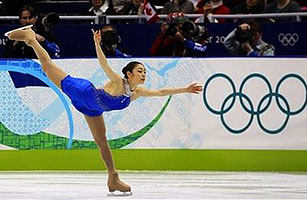
South Korea's Kim Yu-Na performs her free program during the women's figure-skating competition at the Vancouver Olympics on Feb. 25, 2010
Call it the Asian Invasion. Or the Beast from the East. But for the first time in Olympic history, Asian skaters stood upon the podium in three of the four figure-skating events. With South Korea's Kim Yu-Na winning a gold medal and Japan's Mao Asada a silver with their skates on Thursday, Feb. 25, athletes from the Far East earned five of the 12 figure-skating medals in Vancouver. It's the highest haul so far in the sport at the Olympics for those from the Pacific Rim, and it signals the beginning of what many anticipate will be a shift of the podium from West to East. U.S. ladies Mirai Nagasu and Rachael Flatt finished fourth and seventh, respectively.
The highly anticipated ladies' free skate became a showdown between Kim and Asada, who skated back to back before a capacity crowd in the Pacific Coliseum. Kim took the ice first, made the sign of the cross, then delivered a record-setting performance set to Gershwin that earned her not only the Olympic gold but the highest point total of any woman so far under the new scoring system, which has been in place since 2006. As she twirled to a stop after her final spin, most of the 11,771 spectators were on their feet, including Olympic and world champions like Michelle Kwan, who was in the crowd as a fan, taking out her camera phone to capture Kim's tearful bows at the end of her program.
After warming up amid the roaring of the crowd at Kim's scores, Asada landed two triple Axels, making history herself as the first woman to complete two of those jumps — the most difficult that any female competitor performs — in a single program at any competition. (She also landed a triple Axel in the short program on Tuesday.) Close to the end of her program, however, she caught her heel on the ice and couldn't launch into her second-to-last jump, a triple toe loop, losing precious points.
It's a testament to her skating skills that Kim, the first South Korean skater to win gold, with her score of 150.06 in the free program, surpassed Asada's score of 131.72 for the night, which included the two high-scoring triple Axel jumps. The difference came in Kim's delivery. The South Korean earned only positive points for her execution of jumps, spins, spirals and transitions, while Asada was downgraded and lost points for underrotating a jump. "It was toward the end of my performance, and I think my legs were a little tired," said Asada after her program. "I wish I would have completed that jump, and I have some regret over that. One thing I can say is that I am proud of the fact that I completed three successful triple Axels at these Olympic Games."
The pressure on both skaters to perform was nearly suffocating, as media coverage of their every practice was documented for millions back home in video and print. When arena officials arrived to open the doors on Thursday at 5:45 a.m., there was already a knot of Japanese cameramen ready to rush in and grab prime shooting spots; rumors were that they had spent the night outside the arena.
Thousands of miles away, life went on pause across the Korean Peninsula as students (now on winter break) and office workers all stopped what they were doing to watch Kim's program at 1:20 p.m. Seung Jun Lee, a 16-year-old high school student in Yangju, 30 miles north of Seoul, returned home from cram school at lunch to watch Kim skate with his family. "Maybe I will have to skip class today," he predicted amid the excitement. Even businessmen had caught Kim fever and were willing to suffer a dip in productivity during her skate. "When Kim Yu-Na perform[ed], I let all the workers stop, and we all watched together on the TV in the company," said Beom Jin Hong, CEO of an electronics-manufacturing company in Incheon. At Kim's high school in Gyeonggi province, from which she graduated last year and where her Olympic skating teammate Min Jung Kwak is currently a student, hundreds of students and local residents gathered in the auditorium to watch and cheer Kim and Kwak. "Even though we're on a [three-month winter] vacation from school, almost every teacher gathered in the school to cheer Kim Yu-Na together," said Young Ae Choi, an economics teacher at the school. "Today is Gunpo Suri High School's big celebration day. We're also preparing a big cheering party for later today. I'm so proud of her."
While all week Kim denied feeling burdened by those expectations, she had clearly bottled up some anxiety that needed a release on Thursday. Just after hitting her final pose, she broke down in tears, unable to believe that all the anticipation about the Olympics was finally over. "I still can't believe my performance," she said. "I don't know why I cried. I think I thought it might not turn out well, so when I finished my program, I felt good."